World mum as Modi bulldozes all human rights
Rights activists say roughshod crackdown reminiscent of Israeli occupying forces presages end of Indian republic
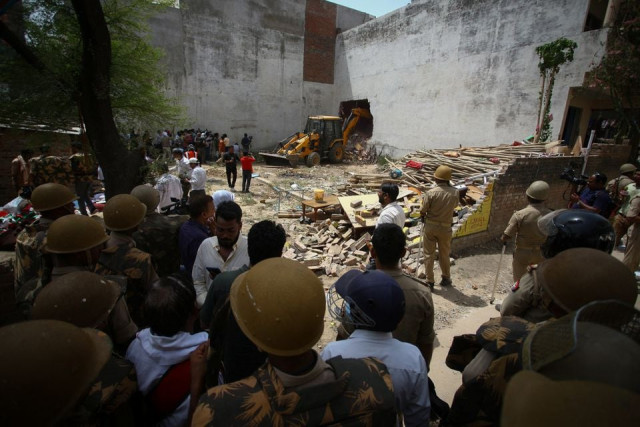
Bulldozers are being rumbled into Muslim localities in India to tear down houses and impose collective punishment on alleged rioters — but none of this merits more than a yawn in the international community that watches the spectacle with a deafening silence.
The long arm of the heavy earthmovers, ruthlessly clawing its way into the intimate chambers of the homes of dissidents, is the latest symbol of the Hindutva India, while the long-celebrated democracy flounders under the concrete rubble.
But the Modi's rule, which has virtually reneged on all international rights conventions, has thus far interestingly managed to elude all radars that otherwise register an eat-piercing bleep over "illiberal" moves taken by regimes across the world.
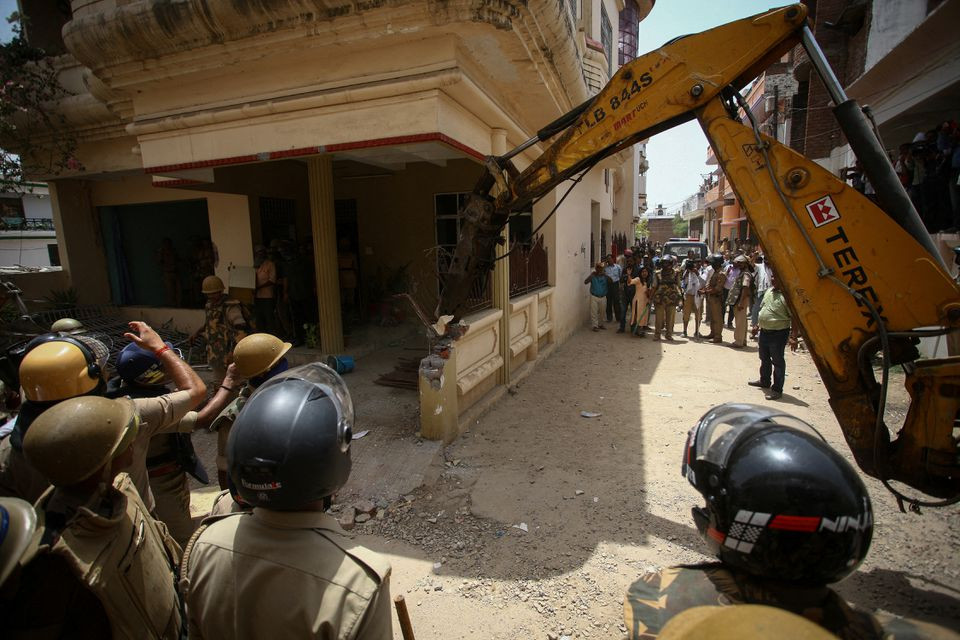
Heavy equipment is used to demolish the house of a Muslim man that Uttar Pradesh state authorities accuse of being involved in riots last week, that erupted following comments about the Prophet Mohammed by India's ruling Bharatiya Janata Party (BJP) members, in Prayagraj, India, June 12, 2022. Authorities claim the house was illegally built. Photo: Reuters
The screams of the minority community, muffled by the roughshod crackdown, have so far not penetrated the indifference of global champions of human rights or pricked their conscience: a galling truth that mocks the increased awareness of human rights in a globalised world.
India was turned upside down last week by waves of massive protests after derogatory remarks were made by senior members of the ruling BJP about Prophet Muhammad (peace be upon him). The uprising has since mushroomed into a new and volatile moment of crisis that has touched a deeper chord of discontent.
Read: Hindu activists, academics condemn BJP's blasphemous remarks
The response by the Indian authorities sent a chilling message to the protesters as the government swung out against them with a borrowed infamous tactic from Israeli occupying forces in Palestine.
Although the Indian government has played up the “illegal encroachment” as its rationale for the brute force, the fact that these arbitrary demolitions are being carried out only against the alleged rioters of only Muslim community shows that the purpose seems to be to impose collective punishment.
The punitive house demolitions are being carried out without proper court proceedings and grossly violate Article 17(2) of the Universal Declaration of Human Rights (UDHR), which has also been judicially integrated into the Indian constitution
The provision clearly stipulates that no one shall be arbitrarily deprived of his property Likewise, Article 11 of the said declaration states that everyone charged with a penal offence has the right to be presumed innocent until proven guilty according to the law in a public trial at which he has had all the guarantees necessary for his defence.
Laws targeting Muslims
With the ruling BJP proceeding full steam ahead with the roughshod crackdown with little concern on its part to dress up its actions with some semblance of legality, government critics have sounded alarms that the quick and cold “justice” to the alleged rioters is dismantling the Indian republic.
Amnesty’s Aakar Patel told The Express Tribune that the BJP applies the method for the collective punishment with the help of laws it designed for the purpose. He added that the ruling party draws the legality from the policies it introduced with the purpose of targeting Muslims.
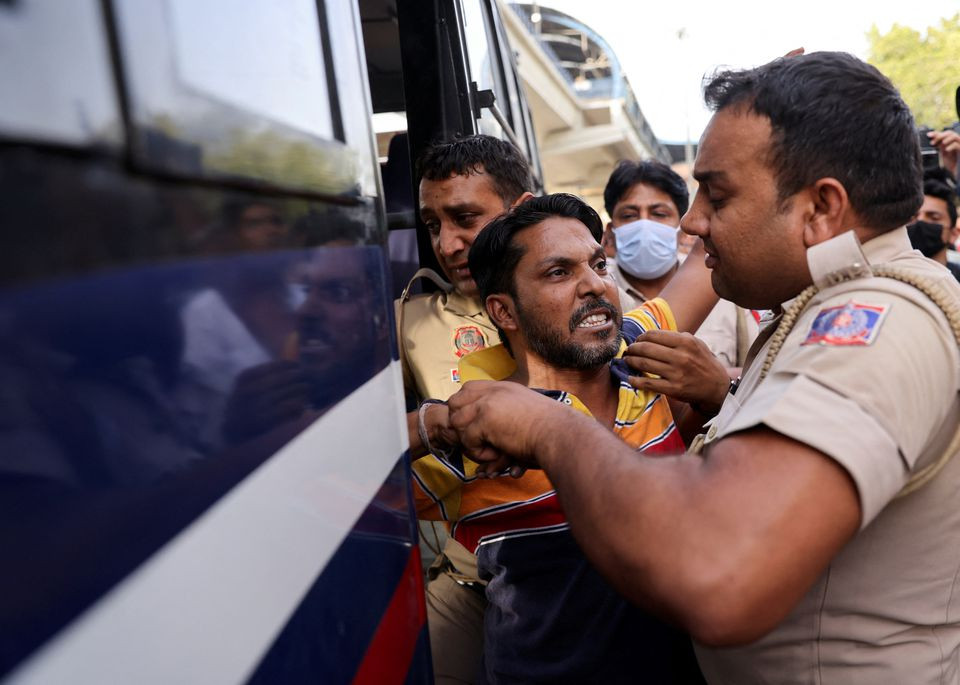
Police officials detain a Hindu right-wing group supporter who was attending a march in support of the suspended Bharatiya Janata Party (BJP) spokeswoman Nupur Sharma for her comments on Prophet Mohammed, in New Delhi, India, June 11, 2022. Photo: Reuters
The recent demolitions were in line with the laws BJP has introduced since 2014 and later dialled up the laws in 2019, he added.
Read More: India using brute force to browbeat Muslims into submission: PM Shehbaz
Gurmehar Kaur, an independent Indian journalist, while speaking to The Express Tribune, noted that the illegal bulldozing presage the unravelling of the Indian republic.
"The illegal bulldozing is not only causing immense anguish and misery but also a veritable dismantling of the Indian republic," the staunch critic of the Modi-led regime said.
‘Decline in national character’
The most striking and ignominious symbol of the degradation of human rights flashed across the television channels when robust news anchors salivated over the theatrics of the demolitions and forced evictions.
On Friday, as the authorities demolished activist Javed Mohammed’s house in Prayagraj, news channels covering the live incident cheered the spectacle with a triumphalist tone.
During a live broadcast of the demolition, a reporter from ABP News said, “Ye karwaai nai ye sandesh hai dangaaiyoon ke liye. Ye UP hai…” (This is not a proceeding but a message to rioters. This is Uttar Pradesh).
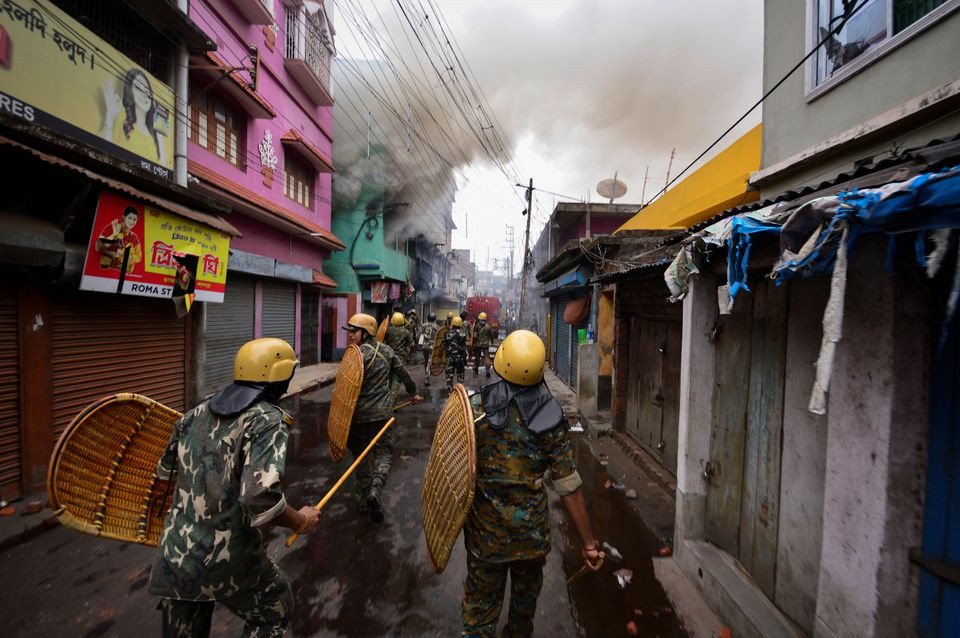
Security personnel patrols on a street after violence erupted between police and protestors over a comment on Prophet Mohammed by Bharatiya Janata Party (BJP) member Nupur Sharma, in Howrah on the outskirts of Kolkata, India, June 11, 2022. Photo: Reuters
On Sunday morning, 19-year-old Sumaiya Fatima sister of activist Afreen Fatima and her mother Parveen Fatima were asked by the police to stay at the relative’s house and not move around. Hours later, they saw on live TV that their home was being razed to the ground as people celebrated.
“Who would have thought that countless fellow Indians would turn into a mob?” Gurmehar expressed shock over the gleeful coverage of the vicious attacks.
“As an Indian, it is heartbreaking to behold,” Gurmehar said and condemned the hate-filled atmosphere. “One that cheers for those who kill is an apologist for those who destroy lives.”
One sees a decline in national character, she lamented.
Last week, experts were taken by surprise after India appeared to have caught off-guard as volley after volley of condemnations from Arab nations over the insulting remarks against the Holy Prophet (PBUH) thrust its diplomacy into the throes of a tortured process of introspection and an unusual tightrope it had not walked before.
Read Also: India is troublemaker, not peacemaker: Kashmiri diaspora
The ruling party suspended two of its key politicians and issued clarifications to tamp down the damage as more Muslim nations joined the chorus.
Major trading and economic partners of India in the Gulf including Qatar, Kuwait, Saudi Arabia, UAE, Bahrain and Oman have all denounced the insulting remarks and called for action against those BJP members.
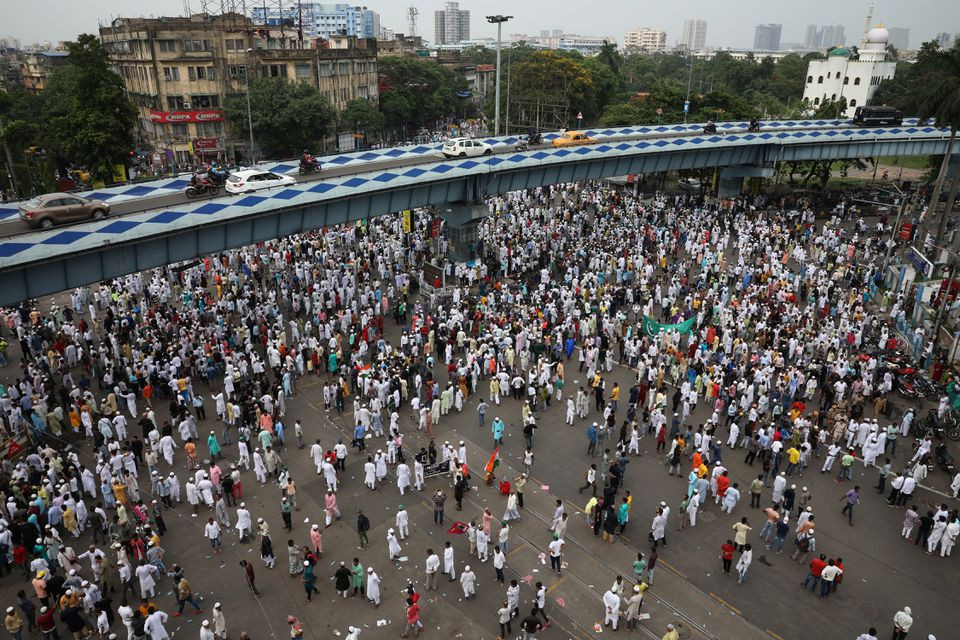
Muslims participate in a protest demanding the arrest of Bharatiya Janata Party (BJP) member Nupur Sharma for her comments on Prophet Mohammed, in Kolkata, India, June 10, 2022. Photo: Reuters
Irate over the derogatory remarks, these countries summoned the Indian envoys in a rare move with Qatar going a few steps ahead and demanding a formal apology.
However, the boiling anger now seems to have cooled to a simmer, losing the steam that had emboldened the beleaguered community to spill onto the streets and voice its protests over the rising Islamophobia.
International laws being violated in India
- Punitive house demolitions: Administratively approved demolitions without proper court proceedings, forced eviction of innocent people from their homes, and the destruction of their private property as collective punishment for the alleged ‘crimes’ of others.
- Right of Housing - International Human Rights
- Article 25 of the Universal Declaration of Human Rights (UDHR) –everyone has the right to a standard of living adequate for the health and well-being of himself and of his family, including food, clothing, housing and medical care.
- Article 11.1 of the International Covenant on Economic, Social and Cultural Rights (ICESCR) – everyone has the right to an adequate standard of living for himself and his family, including adequate food, clothing and housing, and to the continuous improvement of living conditions. Countries are under an obligation to take appropriate steps to ensure the realisation of these rights such as the right to adequate housing.
- Protection of Private Property – International Human Rights
- Article 17(2) of the Universal Declaration of Human Rights (UDHR) - no one shall be arbitrarily deprived of his property.
- Article 8 of the European Convention on Human Rights - right to respect for private and family life, home and correspondence.
- Article 17 of the International Covenant on Civil and Political Rights (ICCPR) – everyone has the right to own property alone as well as in association with others and that no one shall be arbitrarily deprived of his property.
- Protection against Cruel, Inhuman, Degrading, Treatment and Punishment – International Human Rights
- Article 16 of the Convention Against Torture – prohibits purely punitive demolitions.
- Article 5 of the Universal Declaration of Human Rights (UDHR) – prohibits torture or cruel, inhuman or degrading treatment or punishment.
- Requirement to Follow Due Process of Law – International Human Rights Law
- Article 11 of the Universal Declaration of Human Rights (UDHR) - everyone charged with a penal offence has the right to be presumed innocent until proven guilty according to law in a public trial at which he has had all the guarantees necessary for his defence.
- Article 14(2) of the International Covenant on Civil and Political Rights (ICCPR): right to presumption of innocence until proven guilty.
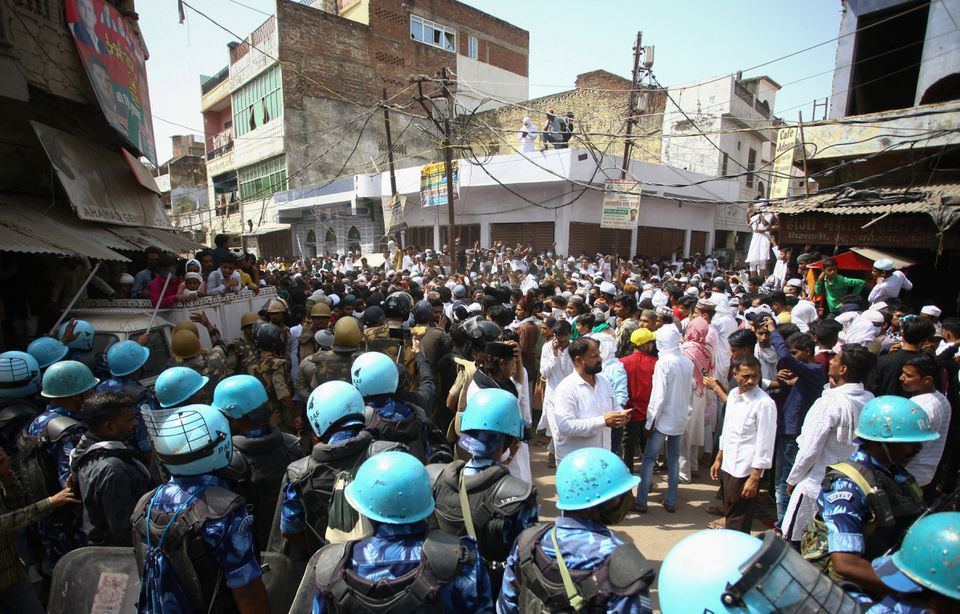
Protestors clash with police during a protest demanding the arrest of Bharatiya Janata Party (BJP) member Nupur Sharma for her comments on Prophet Mohammed, in Prayagraj, India, June 10, 2022. REUTERS
Prohibition During Armed Conflict
- Protection of Private Property even in Occupied Territories – International Humanitarian Law
- Status Quo: Article 43 of The Hague Regulations - the occupying force is obliged to maintain the status quo ante bellum of the territory.
- Minimum Humanitarian Guarantees: Article 64 of the Fourth Geneva Convention - occupying Power allowed to alter laws in the occupied territory that do not meet the minimum humanitarian guarantees advanced in the Geneva Conventions.
- Protection of Private Property: Article 46 of The Hague Regulations – private property cannot be confiscated.
- Prohibition of Destruction of Property: Article 53 of the Fourth Geneva Convention - the destruction of property of the occupied population is prohibited “except where such destruction is rendered absolutely necessary by military operations”.
- Prohibition of Collective Punishment
- Article 50 of The Hague Regulations
- Article 33 of the Fourth Geneva Convention
- Article 75 of Additional Protocol I
- Customary international law
- ICRC Commentaries to the Fourth Geneva Convention: penalties of any kind inflicted on persons or entire groups of persons in defiance of the most elementary principles of humanity, for acts that these persons have not committed

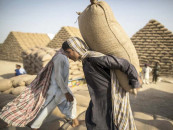


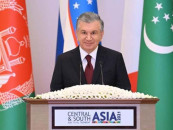
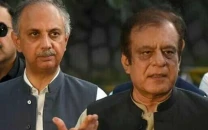
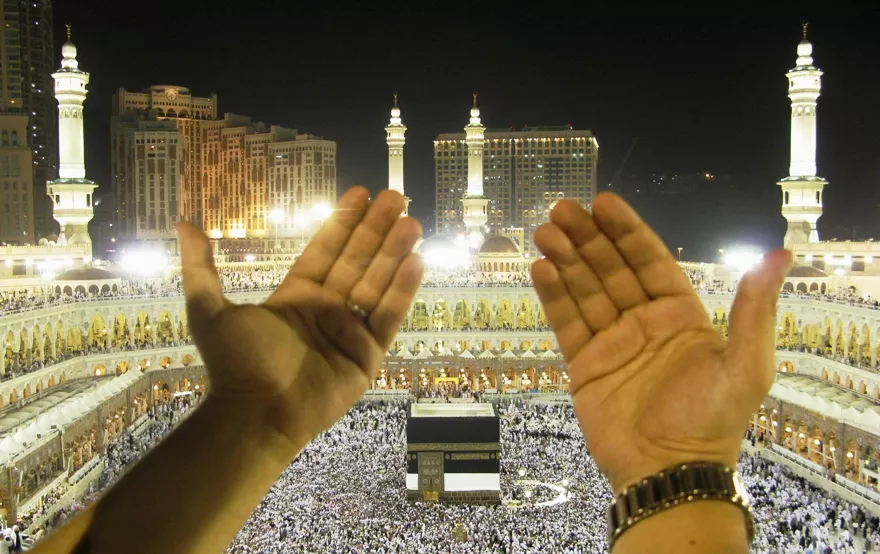












COMMENTS
Comments are moderated and generally will be posted if they are on-topic and not abusive.
For more information, please see our Comments FAQ